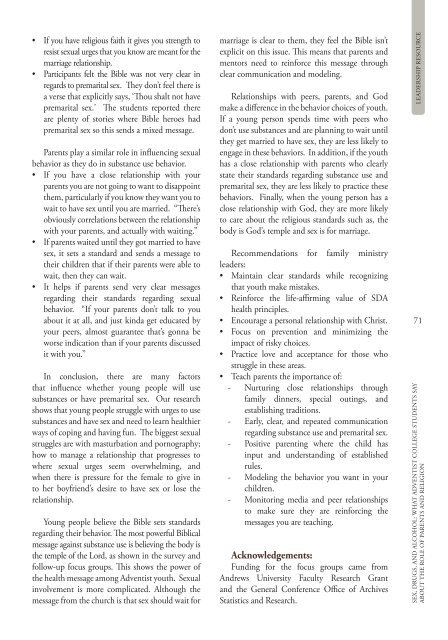HEALTHY FAMILIES FOR ETERNITY
FM_Planbook%202016-eng
FM_Planbook%202016-eng
You also want an ePaper? Increase the reach of your titles
YUMPU automatically turns print PDFs into web optimized ePapers that Google loves.
• If you have religious faith it gives you strength to<br />
resist sexual urges that you know are meant for the<br />
marriage relationship.<br />
• Participants felt the Bible was not very clear in<br />
regards to premarital sex. They don’t feel there is<br />
a verse that explicitly says, ‘Thou shalt not have<br />
premarital sex.’ The students reported there<br />
are plenty of stories where Bible heroes had<br />
premarital sex so this sends a mixed message.<br />
Parents play a similar role in influencing sexual<br />
behavior as they do in substance use behavior.<br />
• If you have a close relationship with your<br />
parents you are not going to want to disappoint<br />
them, particularly if you know they want you to<br />
wait to have sex until you are married. “There’s<br />
obviously correlations between the relationship<br />
with your parents, and actually with waiting.”<br />
• If parents waited until they got married to have<br />
sex, it sets a standard and sends a message to<br />
their children that if their parents were able to<br />
wait, then they can wait.<br />
• It helps if parents send very clear messages<br />
regarding their standards regarding sexual<br />
behavior. “If your parents don’t talk to you<br />
about it at all, and just kinda get educated by<br />
your peers, almost guarantee that’s gonna be<br />
worse indication than if your parents discussed<br />
it with you.”<br />
In conclusion, there are many factors<br />
that influence whether young people will use<br />
substances or have premarital sex. Our research<br />
shows that young people struggle with urges to use<br />
substances and have sex and need to learn healthier<br />
ways of coping and having fun. The biggest sexual<br />
struggles are with masturbation and pornography;<br />
how to manage a relationship that progresses to<br />
where sexual urges seem overwhelming, and<br />
when there is pressure for the female to give in<br />
to her boyfriend’s desire to have sex or lose the<br />
relationship.<br />
Young people believe the Bible sets standards<br />
regarding their behavior. The most powerful Biblical<br />
message against substance use is believing the body is<br />
the temple of the Lord, as shown in the survey and<br />
follow-up focus groups. This shows the power of<br />
the health message among Adventist youth. Sexual<br />
involvement is more complicated. Although the<br />
message from the church is that sex should wait for<br />
marriage is clear to them, they feel the Bible isn’t<br />
explicit on this issue. This means that parents and<br />
mentors need to reinforce this message through<br />
clear communication and modeling.<br />
Relationships with peers, parents, and God<br />
make a difference in the behavior choices of youth.<br />
If a young person spends time with peers who<br />
don’t use substances and are planning to wait until<br />
they get married to have sex, they are less likely to<br />
engage in these behaviors. In addition, if the youth<br />
has a close relationship with parents who clearly<br />
state their standards regarding substance use and<br />
premarital sex, they are less likely to practice these<br />
behaviors. Finally, when the young person has a<br />
close relationship with God, they are more likely<br />
to care about the religious standards such as, the<br />
body is God’s temple and sex is for marriage.<br />
Recommendations for family ministry<br />
leaders:<br />
• Maintain clear standards while recognizing<br />
that youth make mistakes.<br />
• Reinforce the life-affirming value of SDA<br />
health principles.<br />
• Encourage a personal relationship with Christ.<br />
• Focus on prevention and minimizing the<br />
impact of risky choices.<br />
• Practice love and acceptance for those who<br />
struggle in these areas.<br />
• Teach parents the importance of:<br />
- Nurturing close relationships through<br />
family dinners, special outings, and<br />
establishing traditions.<br />
- Early, clear, and repeated communication<br />
regarding substance use and premarital sex.<br />
- Positive parenting where the child has<br />
input and understanding of established<br />
rules.<br />
- Modeling the behavior you want in your<br />
children.<br />
- Monitoring media and peer relationships<br />
to make sure they are reinforcing the<br />
messages you are teaching.<br />
Acknowledgements:<br />
Funding for the focus groups came from<br />
Andrews University Faculty Research Grant<br />
and the General Conference Office of Archives<br />
Statistics and Research.<br />
LEADERSHIP RESOURCE<br />
71<br />
SEX, DRUGS, AND ALCOHOL: WHAT ADVENTIST COLLEGE STUDENTS SAY<br />
ABOUT THE ROLE OF PARENTS AND RELIGION


